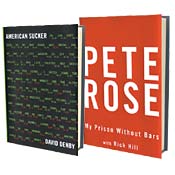
Horatio Alger is the basic American story—but really, who wants to read about success? For literature, a fall is necessary. That’s the premise of two current memoirs: My Prison Without Bars, by Pete Rose, who holds baseball’s record for hits in a career, and American Sucker, by David Denby, The New Yorker’s film critic. However unlikely, Rose and Denby are brothers under the skin. Both tell tales of all-American virtue—Rose’s hunger for competition and passion for excellence, Denby’s desire to maintain his happy home, or at least the Upper West Side classic-seven shell of it. Both are stories of gambling in search of strong sensation and an escape from the reality of life. And both books are in search of a form of absolution—and whatever remuneration and hall-of-fame reinstatement may follow in its wake.
American Sucker is the story of a man who, abandoned by his wife, turns to the stock market for solace—and for the $1 million or so he needs to pay his wife for her share of their apartment. Denby’s worrywart confessional is often a riveting book. In fact, it’s only moderately revelatory, but the thrill comes not because it’s done incompletely but because it’s done at all by such a patently careful man. It’s a domestic sitcom, a financial version of Curb Your Enthusiasm—in this case, it’s “curb your irrational exuberance.” The comedy here—often inadvertent, except for the wonderful title—is the best part: the embarrassment and guilt and endless neurotic feedback loops and hand-wringing. Can I trust these impulses? Am I having fun yet? Ever the critic, Denby is forever setting up a buffer of words between himself and an experience. His howls of rage against his wife, who caused this suffering, seem oddly muffled. He’s too prolix to fully feel his own pain, and he seems surprised at the appearance of this primitive emotion.
While Denby’s impulse when presented with temptation is to analyze it, Rose’s is to yield. As opposed to Denby’s raging superego, Rose is all id, profoundly selfish—it’s a kind of moral autism. My Prison Without Bars tells the whole story, from his all-American boyhood on the banks of the Ohio River to his gambling obsession that led to his lifetime ban from baseball to his incarceration for tax evasion at Marion—not as comfortable as a major-league locker room, but on balance not so bad. The point of Rose’s book is to wipe the smirk off his face for once, be contrite, “move on,” as he says over and over, settle his accounts before he takes the big “dirt-nap.” But the challenge is too great. His happy-go-lucky core seems untouched by the storm around his gambling conduct. He makes common cause with Bill Clinton (who “did what every young man does when he gets his hand caught in the cookie jar—he denied it”) and equates the lawyer who conducted the investigation into his gambling with Kenneth Starr.
Rose and ghostwriter Rick Hill (“my writer,” Rose calls him) stitch together a medical diagnosis of his problem—the dopamine deficiency made me do it. Rose gives it a name—ADHD (attention-deficit hyperactivity disorder)—and wheels out various medical authorities to testify to its validity. He’s in the grip of something he can’t control—the same chemical imbalance that pushed him to baseball greatness.
“I wish I had an easy answer, but I don’t,” he writes, supplying the easiest of answers. “It’s what my writer calls ‘the human condition’—behavior that everyone understands but can’t quite explain.” An American in the grips of a lust for obscene profit is dog-bites-man: the opposite of news. But Denby exists in a rarefied hierarchy of values. He’s a hothouse tulip. He experiences a blue Audi sedan as if it were some kind of biblical revelation, bathed in otherworldly light—has he never seen a car before? He’s confused by his nascent commodity fetishism and its relationship to greed—something that never troubled, say, the lovers of beauty who endowed the Metropolitan Museum.
It’s hard to care about the rising and plunging of Denby’s portfolio, and at any rate the story of the tech bubble is numbingly familiar—most of us have seen these scales before, falling from our own eyes. And Denby’s meditations on greed have an undergraduate quality. Whether caught with a weak stock in his portfolio or on an adulterous weekend, he’s always ready with a long list of questions and a full reading list. The now-notorious Internet-porn addiction seems an exceedingly mild case by any modern standard. No sooner does the lower Denby make an appearance than he gets clobbered with a heavy book bag. Besides, many readers will applaud Denby the capitalist, even Denby the porn addict. He’s thrown off the shackles of his moralizing verbiage—he’s free, even if freedom is just another word for nothing left to lose.
Having explored the Mordor of American capitalism, Denby gets to return to the Shire of the Upper West Side, an older and wiser if poorer hobbit. Order has been restored. Rose isn’t so lucky. He’s met something his will can’t control—not that he’ll stop trying. There’s a persistent tone of exasperation in Rose’s book, as if his memoir were some kind of unpleasant medical procedure he’s consented to undergo. As the title suggests, he’s caged, restless.
Neither man has been changed, at least in the way that literature can demand, not that they don’t have regrets here and there. “Looking back now,” writes Rose, “I might have had more to say to my kids on a personal level.”
But character, prolix or primitive, is destiny. That’s what my writer might call “the human condition.”